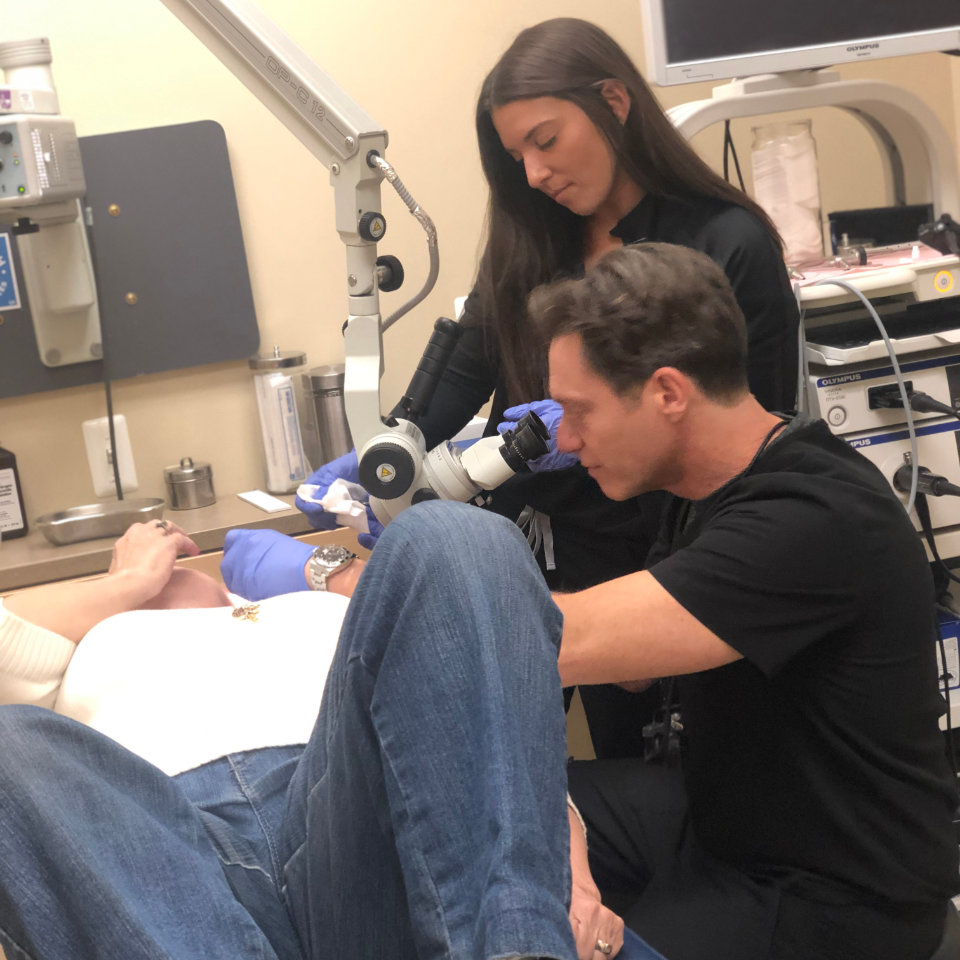When stomach acid travels up the esophagus and reaches the throat and voice box, it causes inflammation and irritation known as laryngopharyngeal reflux (LPR). Unlike traditional gastroesophageal reflux disease (GERD), which typically causes heartburn, LPR often manifests as throat discomfort, persistent cough, or voice changes–earning it the nickname “silent reflux.” Dr. Michael Cohen provides comprehensive evaluation and treatment for LPR at his Long Island practice, helping patients find relief from this troublesome condition through personalized care.
I’ve seen Dr. Cohen and staff multiple times for chronic sinus infections. Him and his team are always so helpful! They treat me nicely and always have me leaving knowing I’ll feel better. From start to finish the whole staff have been great.

Expertise in Diagnosing and Treating LPR
Dr. Michael Cohen brings over 25 years of specialized experience in diagnosing and treating throat disorders, including laryngopharyngeal reflux. As a board-certified otolaryngologist recognized as a Top Doctor by NY Top Docs for 25 consecutive years, he has helped thousands of patients manage this common but often misdiagnosed condition.
“Many patients with LPR have been treated for other conditions like allergies, chronic sinusitis, or recurring throat infections without improvement,” explains Dr. Cohen. “Proper identification of reflux as the underlying cause allows for targeted treatment that addresses the actual problem.” This precise diagnostic approach leads to more effective symptom management and prevention of potential long-term complications.
Understanding Laryngopharyngeal Reflux
Laryngopharyngeal reflux occurs when acidic stomach contents flow backward through the esophagus and reach the larynx (voice box) and pharynx (throat). Unlike GERD, which primarily affects the lower esophagus, LPR involves the upper airway structures, creating a different set of symptoms and concerns.
The condition develops when the lower esophageal sphincter (a ring of muscle at the junction of the esophagus and stomach) fails to close properly, allowing stomach acid to flow upward. Additionally, the upper esophageal sphincter, which normally protects the throat from stomach contents, may not function adequately in patients with LPR.
This acid exposure irritates the delicate tissues of the throat and voice box, causing inflammation, swelling, and damage if left untreated. Studies suggest that LPR affects approximately 10% of patients who visit otolaryngologists and may be present in up to 50% of patients with voice complaints.
Common Symptoms and Their Impact
Patients with LPR typically experience a range of symptoms that can significantly affect quality of life:
Throat Clearing
Persistent need to clear the throat, especially in the morning or after meals, often becoming a habitual response to throat irritation.
Chronic Cough
Non-productive cough that may be worse at night or when lying down, sometimes misdiagnosed as asthma or bronchitis.
Hoarseness
Voice changes including raspiness, reduced volume, or vocal fatigue, particularly notable for professional voice users.
Sensation of a Lump
Feeling of something stuck in the throat (globus sensation) that doesn’t go away with swallowing.
Excess Mucus
Increased throat mucus production and postnasal drip sensation as the body attempts to protect irritated tissues.
Difficulty Swallowing
Discomfort or mild pain when swallowing, sometimes accompanied by a feeling of food sticking in the throat.
Sore Throat
Persistent throat discomfort or soreness, especially in the morning, without other signs of infection.
Voice Fatigue
Reduced vocal endurance and voice that tires quickly during speaking or singing.
These symptoms often lead to significant disruption in daily activities, professional performance, and overall comfort. Many patients modify their diet, limit social interactions, or experience anxiety related to persistent symptoms before seeking proper treatment.
Dr. Cohen’s Diagnostic Approach
Dr. Cohen employs a comprehensive evaluation process to accurately diagnose LPR and distinguish it from other conditions with similar symptoms:
Detailed Medical History
A thorough discussion of symptoms, their timing, triggers, and relationship to meals or body position provides important diagnostic clues. Dr. Cohen explores previous treatments, medication use, dietary habits, and lifestyle factors that may contribute to reflux.
Physical Examination
Dr. Cohen performs a complete head and neck examination with particular attention to the throat structures. Using specialized endoscopic equipment, he can visualize the larynx and surrounding tissues to identify tell-tale signs of reflux damage, including:
- Redness and swelling of the vocal cords and arytenoid cartilages
- Thick mucus in the laryngeal area
- Swelling in the space between the vocal cords
- Tissue changes in the back of the larynx
- Granulation tissue or contact ulcers on the vocal process
Additional Diagnostic Testing
For complex cases or when diagnosis remains unclear, Dr. Cohen may recommend:
- 24-hour pH monitoring to measure acid levels in the esophagus
- Modified barium swallow studies to evaluate swallowing function
- Esophageal manometry to assess the function of the esophageal sphincters
- Gastroenterology consultation for comprehensive digestive evaluation
These diagnostic approaches allow Dr. Cohen to develop a personalized treatment plan that addresses the specific factors contributing to each patient’s reflux.
Comprehensive Treatment Strategies
Dr. Cohen develops individualized treatment plans based on the severity of symptoms, degree of tissue damage, and each patient’s unique circumstances:
Dietary and Lifestyle Modifications
For most patients, changes in diet and habits form the foundation of effective LPR management:
- Dietary Adjustments: Limiting acidic foods (tomatoes, citrus), spicy items, caffeine, chocolate, alcohol, and fatty foods helps reduce reflux episodes for many patients.
- Meal Timing: Eating smaller meals and finishing dinner at least 3 hours before bedtime decreases the likelihood of nighttime reflux.
- Elevation During Sleep: Raising the head of the bed 4-6 inches or using a specialized wedge pillow helps prevent acid from reaching the throat during sleep.
- Weight Management: For overweight patients, even modest weight reduction can significantly improve reflux symptoms by reducing pressure on the stomach.
- Smoking Cessation: Eliminating tobacco use, which relaxes the esophageal sphincters and increases acid production, often yields substantial symptom improvement.
Medical Management
When lifestyle changes alone don’t provide adequate relief, medication therapy may be recommended:
- Proton Pump Inhibitors (PPIs): These medications reduce stomach acid production and allow irritated throat tissues to heal. Unlike GERD treatment, LPR typically requires higher doses and longer treatment duration.
- H2 Receptor Antagonists: These medications may be used alone for mild cases or in combination with PPIs for more comprehensive acid control.
- Alginate-Based Formulations: These create a protective barrier that floats on top of stomach contents, helping to prevent reflux from reaching the throat.
Dr. Cohen works closely with each patient to find the optimal medication regimen, often starting with a more intensive approach and then gradually transitioning to a maintenance program as symptoms improve.
Advanced Interventions
For patients with severe or persistent LPR despite lifestyle changes and medication:
- Surgical Options: Fundoplication procedures that strengthen the lower esophageal sphincter may be considered for severe cases, typically in consultation with a gastroenterologist or surgeon.
- Voice Therapy: For patients with significant voice changes due to LPR, work with a speech-language pathologist can help restore optimal vocal function.
- Swallowing Therapy: When LPR affects swallowing comfort or function, specialized therapy can improve technique and reduce symptoms.
What to Expect During Treatment
Recovery from LPR follows a predictable pattern for most patients:
Initial Response
While some patients notice improvement in throat clearing and cough within a few weeks of starting treatment, complete resolution of symptoms typically takes longer:
- Throat irritation and excess mucus often begin to improve within 2-4 weeks
- Voice quality and throat comfort usually show significant improvement by 6-8 weeks
- Complete resolution of tissue changes may require 3-6 months of consistent treatment
Long-Term Management
For many patients, LPR requires ongoing management to prevent symptom recurrence:
- Continuation of beneficial dietary and lifestyle modifications
- Maintenance medication regimens, often at reduced dosages
- Periodic reassessment to ensure continued symptom control
- Prompt attention to any recurring symptoms
With proper management, most patients achieve excellent long-term control of LPR symptoms and prevention of complications.

Frequently Asked Questions About LPR
While both conditions involve stomach acid refluxing upward, they differ in symptoms and treatment approaches. GERD primarily affects the esophagus and causes heartburn, while LPR affects the throat and voice box, often without heartburn. LPR typically requires longer treatment duration and higher medication doses than GERD.
Untreated LPR can potentially lead to complications including chronic throat inflammation, vocal cord granulomas, laryngeal ulcers, and in rare cases, precancerous changes. It may also worsen asthma and contribute to recurrent ear and sinus infections.
Treatment duration varies by individual. Some patients require 3-6 months of daily medication, while others may need longer-term therapy. Dr. Cohen works with each patient to develop the minimal effective regimen for their specific situation.
Yes, symptoms may recur, particularly if dietary and lifestyle modifications are discontinued. Many patients find they need to maintain some level of preventive measures long-term for optimal symptom control.
Yes, LPR affects children and infants, often manifesting as chronic cough, recurrent croup, asthma-like symptoms, or feeding difficulties. Dr. Cohen has extensive experience treating pediatric LPR with age-appropriate approaches.
Many patients can gradually reintroduce certain foods once their LPR is well-controlled. Dr. Cohen provides guidance on which dietary restrictions are most important for each individual and how to test tolerance to previously restricted foods.

Why Choose Dr. Michael Cohen for LPR Treatment
- Board-certified ENT specialist with extensive experience treating reflux disorders
- Comprehensive diagnostic approach that identifies the specific causes of symptoms
- Personalized treatment plans addressing both symptoms and underlying factors
- Treatment of both adult and pediatric reflux conditions
- Collaborative care with gastroenterologists when beneficial
- Recognition as a Top Doctor by NY Top Docs for 25 consecutive years
Find Relief from Silent Reflux Symptoms in Long Island
Don’t continue to struggle with the persistent throat clearing, cough, voice changes, or discomfort of laryngopharyngeal reflux. With proper diagnosis and targeted treatment by Dr. Cohen, most patients experience significant improvement in symptoms and prevention of potential complications.
Expert LPR care is available at our convenient offices in both Syosset and Port Jefferson Station, making specialized treatment accessible throughout Nassau and Suffolk counties.
Contact our office today to schedule your consultation and take the first step toward throat comfort and improved quality of life.